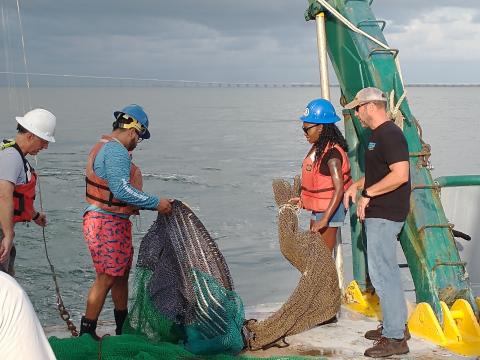Center for Coastal and Marine Ecosystems II
NOAA-CCME II at HRI
The National Oceanic and Atmospheric Administration Center for Coastal and Marine Ecosystems-II (NOAA CCME-II) is a collaboration between the NOAA Educational Partnership Program (EPP) with Florida A&M University as the lead institution and five academic institutions: Bethune-Cookman University, California State University Monterey Bay, Jackson State University, Texas A&M University-Corpus Christi, and University of Texas Rio Grande Valley. NOAA CCME-II was established in 2021 as a Cooperative Science Center through an award funded by the NOAA Educational Partnership Program with Minority Serving Institutions (EPP/MSI) to recruit, educate, train, and graduate a new generation of United States citizens from its partner institutions in NOAA-aligned STEM disciplines equipped to utilize interdisciplinary approaches to address issues confronting marine and coastal communities.
CCME-II research is conducted in the areas of Place-Based Conservation, Coastal Intelligence and Coastal Resilience. Through NOAA-mission aligned research and social science integration, the CCME-II students, faculty, and staff produce results that can be used for better understanding and resolution of short-term and long-term science and policy issues to enhance coastal and marine ecosystems and economies. This research is aligned with multiple states in areas such as healthy fisheries, strong coastal economies, coastal risk mapping, advances in artificial intelligence, shellfish aquaculture, and managing harmful algal blooms. Students are trained in NOAA Science and Technology Focal Areas of Artificial Intelligence, Omics, Uncrewed Systems, and Data.
NOAA CCME-II scholars, in collaboration with NOAA CCME-II faculty and NOAA scientists, conduct research impactful to US coastal communities and economies furthering the NOAA mission. The Center is supported by cooperative agreement NA21SEC4810004 from NOAA EPP/MSI.
Students accepted into CCME-II will receive the following support:
Direct Financial Support
Each scholar will receive a monthly stipend, health insurance, tuition for a full load of classes, travel to conferences, professional development, and funding to cover certain research-related expenses.
Center Wide Core Competency (CWCC) Course
Scholars receive this course, teaching them about NOAA focal areas and how to integrate natural and social sciences into solutions for coastal communities and ecosystems. The CWCC uses a problem-based learning activity to teach how natural and anthropogenic stressors affect use and management of resources in coastal environments. The course explores human-use demands on coastal systems, management approaches and policies, site characterization techniques, ecosystem assessment and valuation, big data, and analysis of policy making paradigms and socioeconomic issues.
NOAA Experiential Research and Training Opportunities (NERTO)
HRI faculty and staff will help scholars identify NOAA internships and experiential training opportunities, and assist with resume and application preparation. Through this unique experience, each scholar will work under a NOAA scientist at a NOAA facility over a 12-week period gaining valuable experience, skills, connections, and a meritorious achievement to add to their curriculum vitae.
Travel to Present Student Research at Conferences
Scholars present their work at scientific conferences with CCME travel funding. All scholars present at the NOAA EPP Biennial Education and Science Forum.
HOW TO APPLY:
To be eligible for the CCME-II Fellowship, students must be U.S. citizens, maintain full-time status and a minimum of 3.0 Grade Point Average, and not be engaged in full-time employment outside the CCME program and/or academic institution. Students must be accepted into an appropriate science graduate degree program to become a CCME scholar and must adhere to the degree program application deadlines. The HRI Chairs and Endowed Chairs select students for the program and, if selected, will supervise their research.
To inquire or apply, students should identify a potential HRI faculty supervisor based on their interests, send an email with a brief explanation of their academic background and research goals, and attach a CV.

